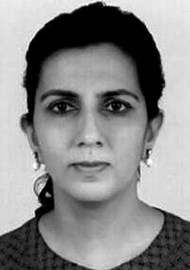I. Development of LINK Partnership
A VISION 2020 LINK India was established by signing a Memorandum of Understanding (MoU) in 2018 between the Post Graduate Institute of Medical Education and Research (PGIMER), Chandigarh, India, Frimley Health NHS Foundation Trust and the International Centre for Eye Health (ICEH) at the London School of Hygiene & Tropical Medicine (LSHTM), UK.
II. Collaborative work with the LINK
A joint application for funding was submitted by the LINK partners to the Ministry of Human Resource Development (MHRD) India under the Scheme for Promotion of Academic and Research Collaboration (SPARC) initiative. The scheme enables productive academic co-operation by supporting critical components that can catalyse impactful research.
Developing a training programme for diabetic retinopathy (DR) screening is critical for timely diagnosis of DR and prevention of vision loss [1]. To address this issue a project entitled ‘Framework for Developing Training Model to strengthen Diabetic Retinopathy Screening and Research in North India’ was submitted. The funding bid was successful.
The goal of this project is to develop a core group of trainers and researchers to establish sustainable strategies for prevention of DR through implementation of DR screening by fostering exchange and mutual learning between the Advanced Eye Centre, PGIMER, Chandigarh and Frimley Health, UK.
III. Activities under the SPARC grant
• Advocacy initiatives
A stakeholder meeting was organised in 2019 to ensure that all participants were aware of the three key strands: the proposed research, training of the healthcare providers and their role in implementation of the study in their area. Stakeholders included members of the Project Advisory Group, ophthalmologists, endocrinologists, paediatricians, nurses, retinal photographers, optometrists, public health personnel from PGIMER, programme officers from Haryana and Punjab and district hospital Panchkula and district hospital Mohali.
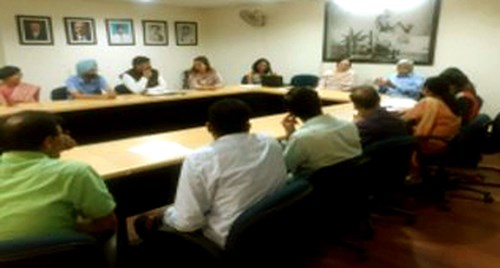
Meeting with stakeholders at PGIMER.
A high-level stakeholder meeting was also held with the Health Secretary of Punjab, to apprise him regarding the burden of diabetes, diabetic retinopathy and need for health system strengthening in Punjab.
With the collective advocacy efforts by PGIMER and Frimley, the State of Punjab installed non-mydriatic fundus cameras at all district hospitals. Taking a step further on the SPARC grant, the National Programme for Control of Blindness (NPCB) in Punjab agreed to launch a DR screening programme in five districts (Patiala, Kapurthala, Mohali, Faridkot & Amritsar) of Punjab. A strong commitment was urged from the programme implementers at district level to start screening at-risk population for diabetes and thereafter for DR. Simultaneously the State of Haryana also installed cameras at district hospitals thanks to active advocacy of the Chandigarh-Frimley LINK. The two states together have a population of about 53 million.
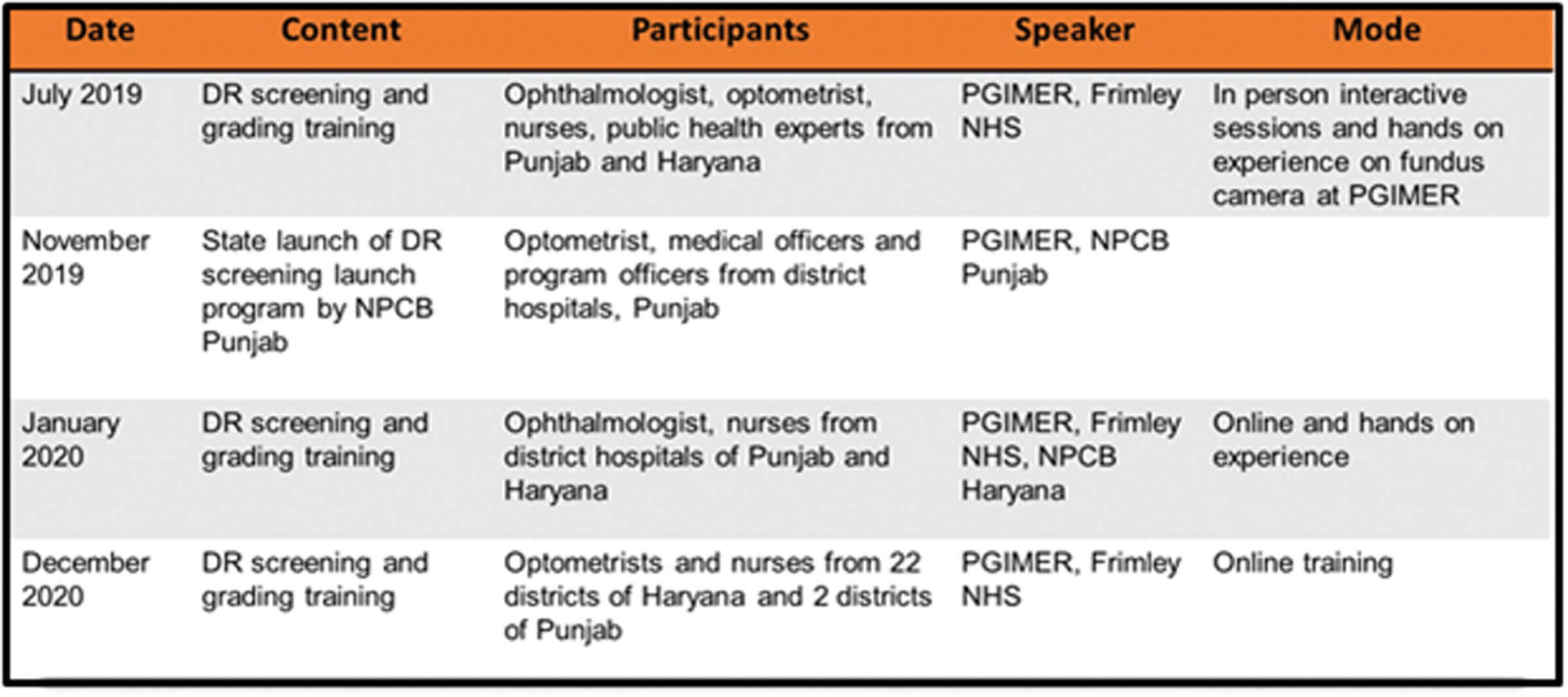
Figure 1: Timeline of training sessions conducted under the SPARC grant.
• Training initiatives
Capacity-building initiatives were based on the principle of task-sharing, which allows non-ophthalmologists to carry out DR screening and grading [2]. Two in-person training sessions for the ophthalmologists, optometrists, nurses and non-ophthalmologists were conducted at the Advanced Eye Centre, PGIMER, Chandigarh in collaboration with Frimley. The healthcare professionals were trained to capture fundus images on non-mydriatic fundus cameras and perform manual grading of the fundus images. Other training included synergistic didactics, hands-on research experience designed in collaboration with stakeholders, and mentorship from local and UK LINK participants.
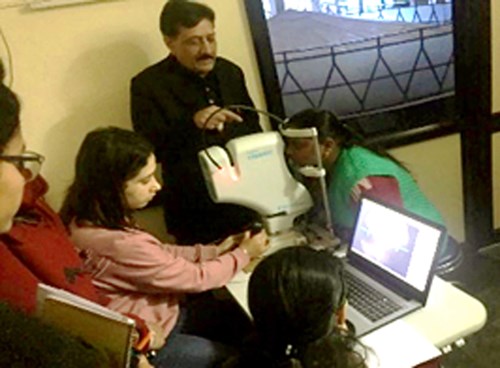
Hands-on training at PGIMER.
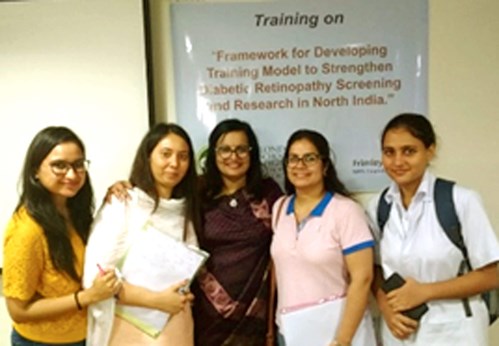
In person training by Professor Dr Geeta, Frimley, NHS Foundation Trust.
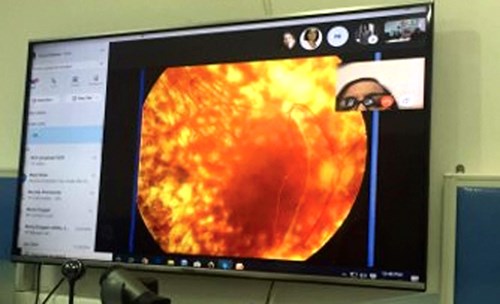
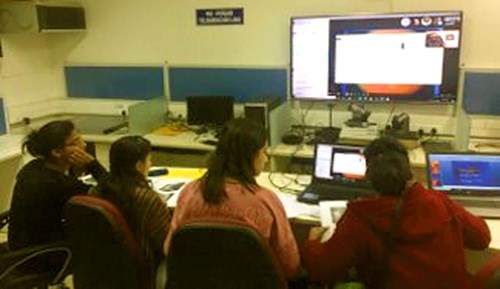
Online training by Professor Geeta Menon of Frimley NHS Foundation Trust.
• Adaptations to the learning challenges during COVID-19
As the threat of the COVID-19 pandemic loomed, it posed a lot of difficulties. During the pandemic, learning was severely impacted due to restrictions on classroom teaching and more engagement of clinical staff in COVID-related duties. Greater shift in focus was seen in pedagogy from face-to-face to online mode.
Through the LINK with Frimley, the first online training workshop entitled ‘Diabetic Retinopathy screening and grading’ was conducted in December 2020. This four-day workshop was hosted on PGIMER Web Ex portal. The workshop engaged participants (optometrists) from Haryana and Punjab health systems. Interactive sessions on diabetes, DR screening and grading, importance of dark room for quality images and camera-handling procedures, were a major part of the workshop. Experts from PGIMER, AIIMS Bhathinda and Manipal Academy of Higher Education (Architecture Department) supported the workshop through the wonderful informative sessions. Feedback showed that most of the participants found the training useful but requested practical demonstration on the fundus camera and revision grading classes to be conducted in the near future. Online learning was also a problem for some due to poor / unstable internet connectivity and other technical issues.
• Capacity building for health system strengthening
Certificate of Higher Education in DR Screening: The challenges posed by COVID-19 led to a change of plan. To continue the capacity-building initiative, six participants (three from Advanced Eye Centre, one from AIIMS Bathinda Punjab, one each from Haryana and Punjab health system) undertook the International Certification course in DR under the SPARC grant. This 40-week online course offers directed learning through structured assessments, to help develop and gain knowledge and skills in diabetic eye screening. The certificate course is run and awarded by Gloucestershire Retinal Education Group (GREG) in partnership with the University of Gloucestershire [3]. Knowledge of diabetes, the processes and equipment commonly used in screening and how to screen and grade for diabetic eye disease were the main course content.
How the certificate course has changed the way of learning: The course is well designed to provide step-by-step information on DR screening and grading. Flexibility in the course modules helps in reading and absorbing the material. Ability to attend the training as per the student’s schedule was very helpful in planning the day-to-day work and the course. Course content was provided in the form of pre-recorded video lectures and reading material in simplified language available at any time.
Benefits from the certificate course: The participants trained through the course will be the master trainers for the non-ophthalmologist workforce at state and district levels across Punjab and Haryana.
• Research activities
Before embarking on the research study, one of the LINK team from Chandigarh, Dr Ankita Kankaria, visited ICEH, LSHTM to finalise the training manual, protocol, study tools and implementation plan for the field study. A baseline assessment of DR screening practices was carried out at district hospitals in Punjab and Haryana. Through the SPARC project, non-ophthalmologist-based DR screening started, to address the gap of availability of ophthalmologists. Nurse-led DR-screening started at one district hospital in Haryana and Punjab. A similar nurse-led DR screening initiative was started at the endocrinology clinic at PGIMER but was soon disrupted by the COVID-19 pandemic.
During the baseline study it was found that there was a lack of routine DR screening activities at study sites, due to heavy workload. The findings from the baseline study were presented at the Royal College of Ophthalmologists Congress in 2021. Additionally, there were issues about non-compliance with DR treatment and a need to identify strategies to improve uptake of DR treatment.
Another study was therefore planned to determine the factors responsible for the low uptake of treatment in patients after they were diagnosed with DR. This was a retrospective record review conducted in the month of July 2021 in the retina clinic at a public sector super-specialty eyecare hospital in northern India. Uptake (also no-uptake and partial uptake) and number and proportion of patients were determined from the records. A questionnaire was administered by telephone to explore the reasons for non-uptake and partial uptake. The results of the study are currently being analysed and prepared for publication. The results will inform how DR screening services in Punjab and Haryana address patient non-compliance with treatment in future.
Way forward
Since the states of Punjab and Haryana are already working together on a DR screening programme under the SPARC grant, an innovative idea being considered is to have a centralised reading centre (RC) for monitoring and feedback on the quality of images captured at the screening sites. The RC will be a sustainable model for hosting retinal images to provide standardised, anonymised and objective grading of study images by trained graders.
References
1. Vujosevic S, Aldington SJ, Silva P, et al. Screening for diabetic retinopathy: new perspectives and challenges. Lancet Diabetes Endocrinol 2020;8(4):337-47.
2. Rani PK, Takkar B, Das T. Training of non-ophthalmologists in diabetic retinopathy screening. Indian J Ophthalmol 2021;69(11):3072-5.
3. Gloucestershire Retinal Education Group. Certificate of Higher Education in Diabetic Retinopathy Screening.
https://www.gregcourses.com/
certificate-of-higher-education-in-diabetic
-retinopathy-screening
(Last accessed December 2021).
COMMENTS ARE WELCOME




